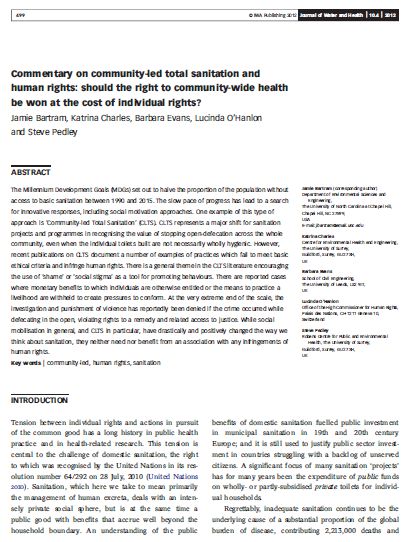Commentary on community-led total sanitation and human rights: Should the right to community-wide health be won at the cost of individual rights?
Bartram, J. et al. (2012)

Published in: 2012
Publisher:
Journal of Water and Health, Vol 10 No 4 pp 499–503 © IWA Publishing 2012, doi: 10.2166/wh.2012.205
Author:
Bartram, J. et al.
Uploaded by:
SuSanA secretariat
Partner profile:
common upload
8483 Views
256 Downloads
Content - Summary
The Millennium Development Goals (MDGs) set out to halve the proportion of the population without access to basic sanitation between 1990 and 2015. The slow pace of progress has lead to a search for innovative responses, including social motivation approaches. One example of this type of approach is ‘Community-led Total Sanitation’ (CLTS). CLTS represents a major shift for sanitation projects and programmes in recognising the value of stopping open-defecation across the whole community, even when the individual toilets built are not necessarily wholly hygienic. However, recent publications on CLTS document a number of examples of practices which fail to meet basic ethical criteria and infringe human rights. There is a general theme in the CLTS literature encouraging the use of ‘shame’ or ‘social stigma’ as a tool for promoting behaviours. There are reported cases where monetary bene?ts to which individuals are otherwise entitled or the means to practice a livelihood are withheld to create pressures to conform. At the very extreme end of the scale, the investigation and punishment of violence has reportedly been denied if the crime occurred while defecating in the open, violating rights to a remedy and related access to justice. While social mobilisation in general, and CLTS in particular, have drastically and positively changed the way we think about sanitation, they neither need nor bene?t from an association with any infringements of human rights.
Additional information
Special permission was granted for a copyright waver so that this pdf file could be placed in the SuSanA library.
Permission granted by Emma Gulseven, Journals Manager (on 14 January 2013)
egulseven@iwap.co.uk
IWA Publishing
Alliance House, 12 Caxton Street
London SW1H 0QS, UK
This pdf file may not be disseminated on another website, e-mailing list or similar without permission from the publisher. It is only allowed to use it for personal viewing/reading of individuals accessing the SuSanA library.
Bibliographic information
Bartram, J. et al. (2012). Commentary on community-led total sanitation and human rights: Should the right to community-wide health be won at the cost of individual rights?. Journal of Water and Health, Vol 10 No 4 pp 499–503 © IWA Publishing 2012, doi: 10.2166/wh.2012.205
Filter tags
East Asia & Pacific English Sub-Saharan Africa Sustainable WASH in institutions and gender equality (WG7)















